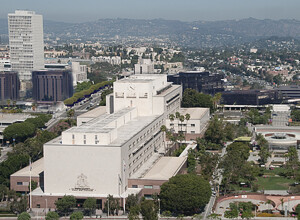
Stanley Mosk Courthouse, Los Angeles. Photo credit: www.lacourt.org
Civil courts in California were already backlogged before they basically shuttered in March. Now with COVID-19, Los Angeles County is not considering civil trials until at least January 2021 and Orange County’s civil trials are on hold through at least November. So, while we don’t know exactly when the courts will open again for trials, one lawyer has ideas about how to jumpstart the court system when it does open: consider less jurors for each trial.
Rob Shwarts, of Orrick, Herrington & Sutcliffe in San Francisco, argues in a recent article in The Recorder, “We need to get over the idea that there must be 12 jurors in the box to conduct a state court civil trial. This number is not legally required, and while COVID-19 persists, it is simply not a practical or feasible count for the jury.”
For those who have suggested using video conferencing technology, such as Zoom, to jumpstart the process, Shwarts thinks it’s “impractical.”
“Indeed, there is no way to know what screen a juror is looking at so long as the video function of his or her computer is on, raising the specter of juror doing research in real-time,” notes Shwarts. “In another twist, Alameda County Judge Brad Seligman had to address a motion for mistrial, because, while the attorneys were in a private Zoom room with the court, the plaintiff started a conversation with several jurors about the seemingly harmless topic of Zoom backgrounds. We all surely agree that litigants are not only entitled to an impartial jury, but to a jury paying attention to their case’s evidence and to the court’s admonitions.”
